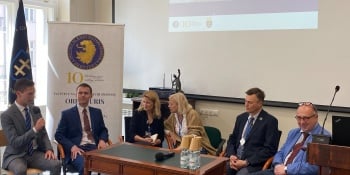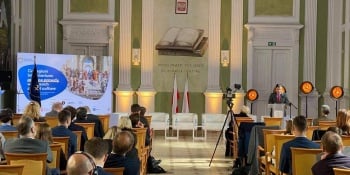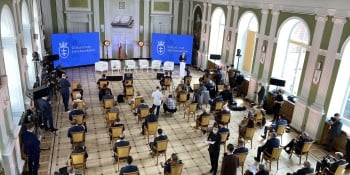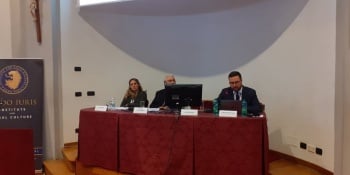
The 10th of December marked the 70th anniversary of enacting the Universal Declaration of Human Rights. On this occasion, the Ordo Iuris Institute and the Christian European Political Movement organised an international scientific conference. This event was a response to the change in the understanding of human rights in certain environments, which have turned them into a tool for political and ideological pressure. This discussion helped to recall the true source of human rights, which is human dignity.
The conference was entitled ‘Legal Implications of Human Dignity’. The guests included scientists and journalists from different countries. They presented the topic by referring to several of its aspects. They raised a number of issues, including law, medicine, psychology and anthropology.
The event was opened by Jerzy Kwaśniewski, the President of the Ordo Iuris Institute. His speech pertained to the changes which have taken place since the enactment of the Universal Declaration.
“The current system has moved far away from the source of human rights, which is the inalienable and inviolable dignity of the human person,” he underlined.
Tymoteusz Zych, PhD, a member of the Board of Directors of Ordo Iuris, gave a lecture entitled: ‘Human dignity as the foundation for the human rights protection system’. It referred to the presentation of the concept of human dignity in human rights acts.
“In the Universal Declaration, human dignity is described as the source of human rights. It is also guaranteed by other documents. It has its place in most constitutions of modern countries. In the Polish Constitution, the concept of human dignity appears three times,” he noted.
Benjamin Harnwell (founder of the Dignitatis Humanae Institute) indicated the consequences of denying the inalienable and intrinsic nature of human dignity. He emphasised that questioning human dignity as the source of rights leads to a dangerous situation, where the state gives and guarantees rights and freedom to people and can thus take them away at any time. Next, Marcin Kulczyk (PhD, a researcher associated with the European Centre for Law and Justice in Strasburg) drew attention to the negative effects of disregarding human dignity as the foundation and source of human rights. Consequently, as Kulczyk concluded, “human rights are once again becoming an instrument of power over men.”
The negative consequences of deprecating human dignity from the perspective of bioethics were highlighted by Błażej Kmieciak, PhD, Director of the Bioethics Centre of the Ordo Iuris Institute. He noted that violation of human dignity causes a series of abuse in medicine, which could be observed, for example, during the Second World War. This abuse can also be seen today when it comes to promoting the killing of unborn children through abortion, or euthanasia of the old and suffering.
Leo van Doesburg from the Christian European Political Movement indicated the opportunities and challenges for the realisation of dignity and rights that can be observed in modern Europe.
“I would like to thank Ordo Iuris for the co-organisation of this important event. We are going through a moral crisis and we must return to our roots to redefine the concept of dignity. There are many challenges ahead of us. We should constantly remind everyone of the meaning of dignity,” he added.

A scientific conference "The Phenomenon of Euthanasia. Interdisciplinary Reflections", co-organized by the Ordo Iuris Institute. During the event, the topic was analyzed from the perspective of medicine, law, sociology, philosophy or theology. Speakers presented, among other things, the legal status related to euthanasia in Poland and other European countries. They pointed out the problems raised by the spread of this procedure. Participants also drew attention to the most important measures to counteract the restriction of the right to life.

Collegium Intermarium has started its academic year. The inauguration ceremony took the form of an international conference attended by scholars, politicians and commentators from the US, France, Hungary, Croatia and Poland, among other countries. The guests included French politician Marion Maréchal, New York Post columnist Sohrab Ahmari, Prof. Adrian Vermuele from Harvard University, and former Speaker of the Sejm Dr Józef Zych. The conference is titled “Collegium Intermarium: a space for truth in the era of cancel culture”.

Representatives of state authorities, outstanding academics and journalists from Poland and abroad take part in the conference inaugurating the establishment of Collegium Intermarium. The goal of the new university is to create a platform of co-operation between academics from the Intermarium region. Its flagship field of specialisation is law, but it also offers a rich programme of postgraduate study courses.

An impediment to the realization of real women's rights is the frequent presentation of the concept in ideological ways. One of the most promoted directions in contemporary discourse to realize women's rights is the gender perspective. However, as it turns out, this concept raises a number of doubts, which stem from its strongly ideological nature and lack of effectiveness in real improvement of the situation of women in the world. The second in the series of conferences "In Defense of Women's Rights" was devoted to these issues.

There is currently a wide-ranging discussion on the concept of women's rights. The Ordo Iuris Institute organized the first in a series of debates on this issue. Two panels were devoted to presenting the political and doctrinal context of the issue of women's rights and women's right to health. The main premise of the conference was to address the issue of women's rights in an ideology-free manner.

The values which form the basis for law have a profound impact on modern Europe. This was the topic of the House on the Rock “Axiology of Law for the Europe of Tomorrow” Conference, which saw many prominent researchers engage in discussion in Rome. The event was organised by the Ordo Iuris Institute and the Pontifical University of St. Thomas Aquinas.